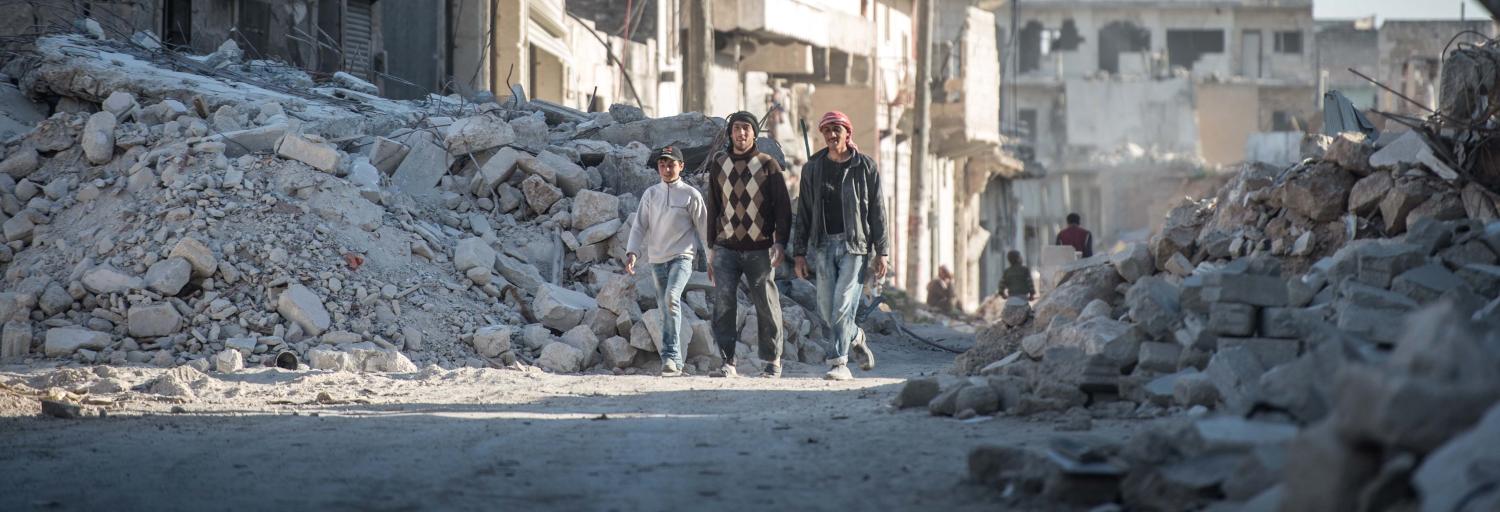Part 1 in this series described the changing mood in Syria towards acceptance of an eventual victory for the Assad regime. This post examines how the practicalities of re-establishing civil society are going to be worked out including, perhaps most importantly, determining who will pay.
The reconstruction bill is mind-boggling: the World bank estimates one-third of Syria's housing stock has been destroyed or damaged, as have half of its medical and education facilities, while the GDP loss amounts to US$226 billion. Reconstruction will take years, and if the Assad regime (or a variation of it) remains in power then the West will be faced with the tricky question of what, if anything, it does to assist. One line of argument is that such funding could be used to leverage political concessions or alter behaviour, succeeding where the backing of armed groups didn’t. But, the regime feels bullish about besting its opponents after years of war, and its inner working are so opaque that there is little prospect of Western (or Gulf) reconstruction money achieving much leverage. Best then not to donate to the reconstruction effort.
But there is always economic opportunity after tragedy. Russia and Iran have ploughed both blood and treasure into Syria and will expect to be rewarded economically. Iran has already won contracts for five gas-fired power plants in Aleppo and is signed up to run a mobile phone network, a phosphate mine, and a parcel of 5000 hectares (around 50 square km) of agricultural land. Iran is keen to invest more in the Syrian reconstruction effort and there is little doubt that Tehran sees closer economic ties (particularly through companies linked to the Revolutionary Guards) as the perfect way to maintain influence in Syria after it eventually withdraws its too-obvious military presence when some kind peace agreement is reached.
Russia, for its part, knows it is an internationally more acceptable foreign investor in Syria than Iran. Russia has had close relations with Syria for 50 years and nearly $20 billion in investment projects in the country pre-war. It will want to recoup those investments and add to its profit-making ventures. There are already reports that private Russian security firms are recovering Syrian economic assets for Damascus in order to get a cut of the subsequent profits. But Moscow has neither the inclination nor the ability to fund Syria’s reconstruction in toto. It has tried to put the onus on the Europeans to help out, though Russia's 'If-not-us-then-Iran' argument is not compelling in the West at the moment.
Meanwhile Damascus, aware of the perils of becoming too economically beholden to one country, has been trying to project an aura of back-to-normal economic activity to woo long-term investors willing to operate in high-risk environments. In August the Damascus International Trade Fair took place for the first time since 2011, although it was marred by a rocket or mortar attack that allegedly killed five people near the entrance to the fairground. Syria has also been busy resuscitating trade deals with India and China, both of whom are likely to be keen to get some return on pre-civil war investments. But even these seemingly ideal investors may present challenges. For example, China has been accused of importing significant numbers of Chinese workers for its infrastructure projects in Africa. This would not be the type of investment approach welcomed (or likely allowed) in Syria.
Damascus has also indicated countries that supported (or at least didn’t actively oppose) the regime will have the inside running for reconstruction contracts. And there is certainly a sense that there is money to be made post-conflict, as indicated by activities at the port of Tripoli in neighbouring Lebanon, and the first inkling of Syria-focused investment interest in Jordan.
Reconstruction is likely to be slow, to favour those areas that remained with the regime, to be geared towards income-producing infrastructure, and to reward individuals within the regime or allied to it. Even if Assad wanted to rebuild the whole country in a deliberate manner he could not find the money, and in any case differing speeds of re-building will have a demonstration effect. If some parts of Syria remain devastated for years in the future as others prosper, it will cause Assad little grief.
One could argue that this will simply perpetuate the rancour that fuelled the uprising in the first place but Damascus is probably betting that, after years of conflict, national and international exhaustion will give Assad a free hand to deal with his opponents. Whatever occurs, no-one should assume that reconstruction in Syria will be a modern, Levantine version of the Marshall Plan.

